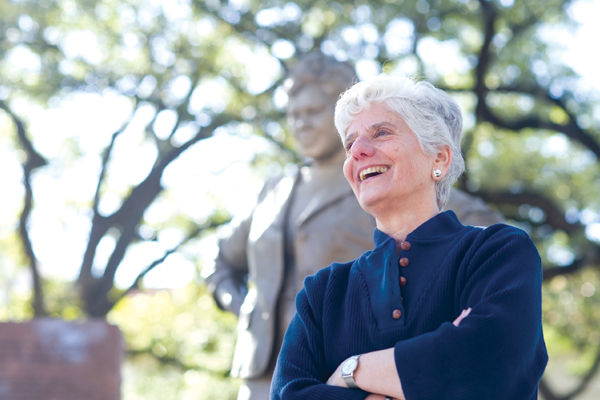Charlie Wilson Chair Paula Newberg is Pakistan Studies Expert
Professor Paula Newberg wants her students to leave her class with this big idea: “Life is complicated, but they can learn to live it well.”
Newberg, who holds the Charlie Wilson Chair in Pakistan Studies in the Government Department, does indeed teach a complicated subject about a complicated region. She joined the UT faculty in 2013 after spending more than 20 years based in Washington, D.C., and overseas, working both in academia and with non-governmental agencies and states on human rights issues. She was serving as director of Georgetown University’s Institute for the Study of Diplomacy when UT recruited her for the position.
“Professor Newberg brings to the university a unique combination of scholarly expertise and years of hands-on experience as a policy analyst and adviser on the region,” says Robert G. Moser, professor and chair of UT’s Government Department. “She is the author of numerous books, monographs, articles and opinion pieces on Pakistan, Afghanistan and South Asia.
“Among her many assignments as a policy specialist, Paula has been an advisor to the United Nations, a Peace Corps country director and a senior associate at the Carnegie Endowment for International Peace,” he adds. “This wealth of experience will enable her to bring together expertise and insights from both the academic and policy worlds.”
“There’s a way that you learn places when you learn them at their worst, which is essentially what human rights people do.”
Paula Newberg
The Charlie Wilson Chair in Pakistan Studies—the first privately funded position of its kind in the United States—was established in 2010 after the College of Liberal Arts responded to a $500,000 challenge grant from the T.L.L. Temple Foundation of Lufkin.
Newberg’s research focuses on rule of law, jurisprudence and governance in the region, along with how countries like Pakistan are dealing with the challenges of climate change, new technology and free expression and difficult governance environments.
“As with the rest of the developing world, Pakistan is now part of global politics in ways that it never imagined it would be 60 years ago, when it became independent,” Newberg says.
Newberg never planned to work in Asia. She first studied central and eastern Europe, but her advocacy work in human rights eventually led her to the region. She first visited Pakistan in 1980 after attending U.N. meetings in Geneva and New Dehli.
“There’s a way that you learn places when you learn them at their worst, which is essentially what human rights people do,” Newberg says. “You develop an association with the place, with its people and its evolution, and Pakistan under (then) military rule led me to ask broader questions—and I’m still doing so more than 30 years later.”
As she worked in south and central Asia, her academic interests and advocacy work merged and led to books, articles and policy engagement. Newberg lived in Pakistan and worked for the United Nations in Afghanistan for the first two-and-a-half years of Taliban rule in the 1990s, and she returned to Afghanistan to work during the first three years of the new post-2001 government.
Newberg says she wants her students to leave her classes realizing they can learn about a new and difficult place and come away after a semester with the tools to understand something quite foreign. More importantly, she wants them to go on and ask more questions to continue to learn new things on their own.
“In the end, none of us are going to live lives circumscribed by the borders of the United States,” Newberg says. “It’s just not a possibility anymore. So, we might as well learn the places that are hardest, and that will help us understand our collective concerns and responsibilities.”
